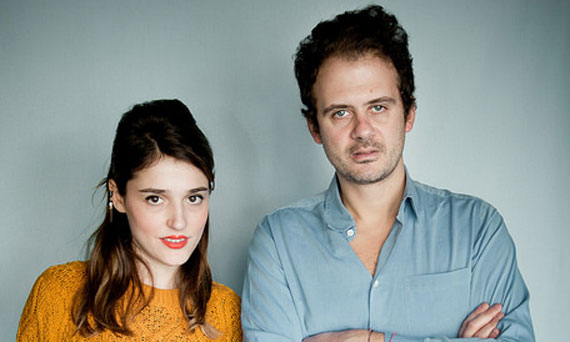Ruben Amar, Lola Bessis • Directors
“We feel more secure about making a movie now”
- Ruben Amar and Lola Bessis discuss Swim Little Fish Swim, the festival sensation that mixes a Nouvelle Vague breeze with mumblecore themes

Having spent almost three years in the US making a name for himself in short films, acclaimed French director Ruben Amar teamed up with his compatriot Lola Bessis to put together their first feature: a love letter to New York, the city that inspired directors like John Cassavetes and Spike Lee. A relaxed and intimate coming-of-age comedy that is as much indebted to the city’s great directors of the 1970s as it is to their descendants belonging to the mumblecore movement and its evolution within the NY indie scene of the 2010s, Swim Little Fish Swim [+see also:
trailer
interview: Ruben Amar, Lola Bessis
film profile] is a semi-autobiographical farewell to the duo’s favorite cinematic backdrop.
Cineuropa: How do two French people set out to make an American indie?
Ruben Amar: It started out as something very organic. We were both always inspired by the New York movies from the ‘70s and ‘80s, especially John Cassavetes and Spike Lee, and while in New York we became very attracted to the new indie scene, this new type of film made with almost nothing. We only had five to six months left in New York when we decided to shoot a movie about it.
Lola Bessis: The film was really inspired by what we observed while living there: we used to film everything with our phones there, things like random scenes from daily life that fascinated us. So at one point, we had seen so many great movies made for no money that we decided that we could do that, too. And we also had visa issues; we had to go back to France at some point, so we only had five months to do everything from pre-production to shooting. So we decided to have a really tiny story, a very simple one, something we could build around the actors.
The theme of artists on the verge of adulthood feels autobiographical.
RA: Yes, it was a coming-of-age theme that we feel especially close to, because while making the film we were also questioning our job as directors a great deal, and all this juggling of money and artistic choice.
LB: Yeah, what kind of an artistic career you want, and what kind of lifestyle you are hoping to get out of it: those were the kinds of questions we were asking ourselves, and we were both at a time between childhood and adulthood, taking on responsibilities and so on.
Has finishing this film and following it on its illustrious festival career helped make you feel more secure about taking your next steps?
RA: We probably feel more secure about making a movie now because it was like a real school for us, full of experiences and really complicated stuff to deal with. So now we feel more comfortable with our stories, for instance – the “whats” and “hows” of storytelling.
LB: Yeah, we learned a lot, both while working with actors on the set, as well as in terms of how to produce a film, how to find funding and so on. At the same time, this film has opened a lot of doors, so now we have a lot of contacts, a lot of producers interested in our next project. So yes, we feel more secure, but at the same time, it’s a job in which you can never feel really secure.
The film debuted in SXSW before having its European premiere in Rotterdam and then moving on to dozens of festivals around the globe. Do different audiences have different reactions?
RA: Absolutely, yes. The Americans over-react to everything...
LB: Yeah, they’re always laughing even when it’s not funny…
RA: …Which is fun for us, but in the end, you’re not really sure if they actually like it or not.
LB: And when we screen in Europe, it’s always weird, because European audiences don’t react that much. Especially in Rotterdam and the north in general, they don’t do anything, it’s total silence; but it doesn’t mean they don’t like it, because when they go out they say, “Oh, I loved it, I was so moved,” and so on. You just don’t feel it in the room.
RA: Apart from that, it’s a question of tolerance, I think. In the States, they’re not as judgemental as we are; they accept what they see, and they discuss it as is. They could challenge you, question you, but not in a mean way. European audiences are much more direct.
Did you enjoy reading this article? Please subscribe to our newsletter to receive more stories like this directly in your inbox.
















